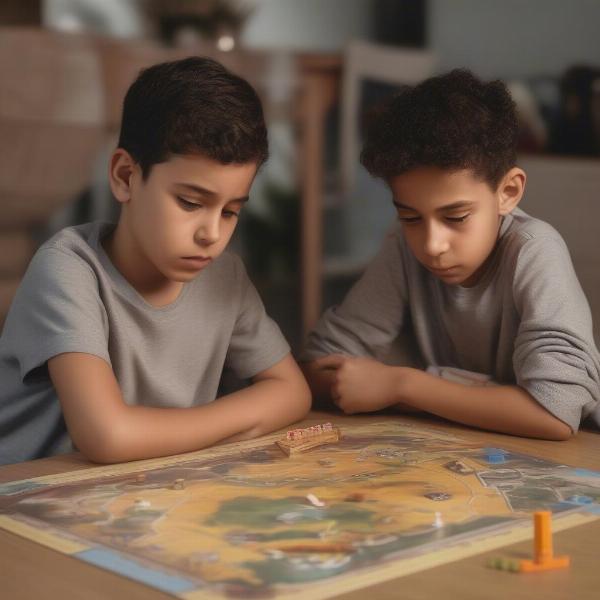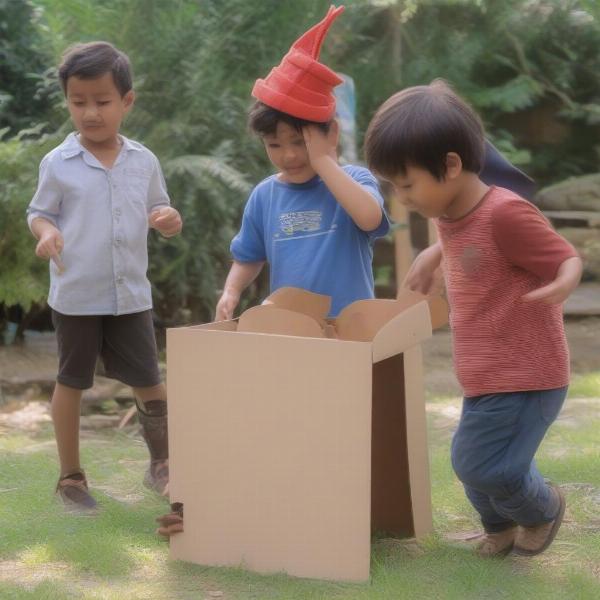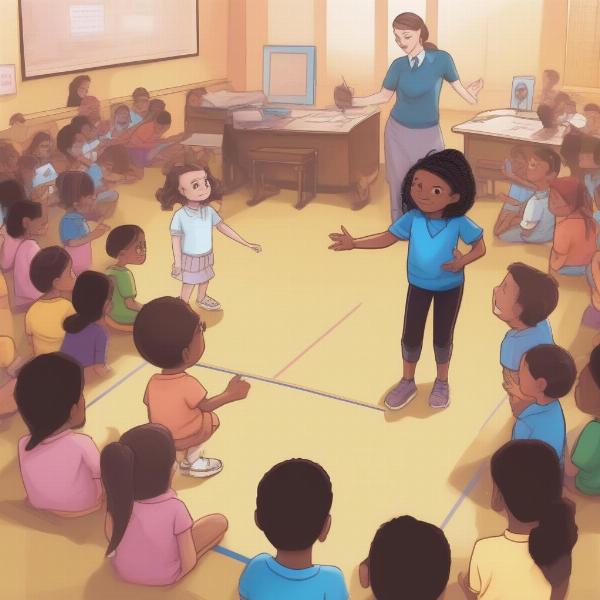Welcome to SupremeDuelist.blog, your ultimate guide to the world of gaming and its broader implications. Today we’re diving deep into a fascinating area: how games, often seen as mere entertainment, can be powerful tools for social skills instruction. This article will explore the various ways in which carefully selected and thoughtfully implemented games can enhance learning and development in social settings, offering insights for educators, parents, and anyone interested in harnessing the positive potential of gaming. We will delve into the specific mechanics, strategies, and game types that are most effective in this domain.
Games are more than just fun; they’re interactive environments where individuals navigate rules, collaborate (or compete), and communicate, mirroring many real-world social dynamics. This makes them an excellent platform for learning and reinforcing essential social skills. From improving teamwork and problem-solving to promoting empathy and effective communication, the applications are vast and varied. Let’s explore how these virtual playgrounds can translate into tangible improvements in real-life social interactions.
Understanding the Power of Games in Social Learning
Games inherently require participants to interact. Whether it’s a complex multiplayer online game or a simple board game, the need to communicate, negotiate, and work within rules provides a structured environment for practicing social skills. Think about the collaborative puzzle solving in a cooperative game where each player’s actions affect the group, or the respectful competition necessary to play a card game fairly. These experiences, repeated and reinforced, build social competencies.
Moreover, games often provide a safe space for trial and error. If a child struggles to share during a board game, the consequences are far less impactful than similar behavior in a school setting. This allows for learning through practice and repetition without the high-stakes pressure of real-world situations. The game offers an opportunity to discuss behavior, make corrections, and then retry. This is crucial in developing social skills and self-awareness.
 kids playing social skills game
kids playing social skills game
What Specific Social Skills Can Be Reinforced Through Games?
Games are incredibly versatile in the skills they can foster. Here’s a look at some specific areas:
- Communication: Games often require players to clearly express their ideas, needs, and strategies. From explaining game rules to coordinating moves, verbal and non-verbal communication are critical.
- Teamwork & Collaboration: Many games are designed for team play, requiring players to collaborate, share resources, and work towards a common goal. This fosters a sense of collective responsibility.
- Problem-Solving: Games often present complex problems that require players to analyze situations, develop strategies, and adapt to changing circumstances. These skills are highly transferable to real-life situations.
- Conflict Resolution: Disagreements can arise in games, providing an opportunity to practice respectful conflict resolution techniques. Players learn how to negotiate, compromise, and find common ground.
- Empathy & Perspective-Taking: Certain games can help players understand different perspectives by having them role-play characters with varying needs, motivations, and backgrounds. This promotes understanding and compassion.
- Patience & Turn-Taking: Many games involve turn-based structures, teaching children patience and respect for others’ turns.
How to Select Games for Social Skill Development
Choosing the right game is critical to effective social skills training. Here are a few key factors to consider:
- Age Appropriateness: The complexity and mechanics of the game should match the developmental level of the players. Games that are too easy will be unengaging, while overly complex ones will lead to frustration.
- Specific Skills Focus: Consider the specific social skill you want to target. For instance, a cooperative game is great for teamwork, whereas a negotiation-heavy game is good for conflict resolution.
- Engaging Theme: Games that are fun and interesting will keep players motivated and invested in the learning process.
- Playtime Length: Select games with suitable playtime to match available time and keep attention. Games should not feel like an endless chore.
- Number of Players: Choose games that can accommodate the number of participants to ensure everyone gets a chance to engage.
“Games are more than just entertainment; they are powerful, immersive environments that can be meticulously designed to promote particular skills,” says Dr. Eleanor Vance, a specialist in educational psychology. “When carefully selected and implemented, games can be an effective supplement to conventional methods of teaching social skills.”
Game Types and Their Effectiveness
Different game types lend themselves to different social skill goals. Here’s a look at some categories:
Cooperative Games
Cooperative games require players to work together towards a shared objective. These games are ideal for teaching teamwork, collaboration, and communication. The focus is on joint effort and collective success, which reduces the element of competition and fosters unity.
- Examples: Forbidden Island, Pandemic, Hanabi
- Benefits: Enhances collaboration, encourages shared decision-making, builds empathy.
- How they help: Players learn to rely on each other, listen to suggestions, and support each other’s roles.
Role-Playing Games (RPGs)
RPGs allow players to take on different personas and navigate complex social scenarios. These games are excellent for developing empathy, perspective-taking, and problem-solving skills. The immersive narratives provide a great opportunity to practice communication and negotiation within a fictional setting.
- Examples: Dungeons & Dragons, Tales from the Loop, Fiasco
- Benefits: Promotes empathy, improves communication skills, encourages creative problem-solving.
- How they help: Players step into different roles, understanding different motivations and perspectives, fostering a wider understanding of social dynamics.
 kids role playing in a social game
kids role playing in a social game
Board Games with Social Interaction
Many traditional board games naturally promote social interaction and the practice of skills such as turn-taking, patience, and respectful competition. These games offer structured settings for reinforcing fundamental social skills.
- Examples: Monopoly, Settlers of Catan, Ticket to Ride
- Benefits: Develops patience, reinforces turn-taking, promotes strategic thinking.
- How they help: Players learn to wait their turn, engage in friendly competition, and manage frustrations, all while adhering to established rules.
Digital Games
Digital games can offer unique interactive experiences that are effective for social skills reinforcement. Games that involve cooperative play, complex puzzle solving, or social simulation can all provide valuable lessons in a variety of social skills.
- Examples: Minecraft, Animal Crossing, Overcooked
- Benefits: Fosters teamwork, encourages problem-solving, facilitates creative expression.
- How they help: Players communicate and collaborate through online interfaces, often making strategic plans together, while building a sense of community and shared responsibility.
Can games really improve communication skills?
Absolutely. Games require players to communicate and strategize to achieve a common goal. Whether verbal or non-verbal, effective communication becomes necessary for success within the game setting.
How do board games promote conflict resolution?
During board games, disagreements and challenges are bound to occur, providing a controlled environment where players can learn to negotiate, compromise, and find mutually acceptable solutions. This helps build resilience and learn respectful ways to navigate conflicts.
Are digital games as effective as traditional games for social learning?
Digital games can be highly effective, offering different immersive scenarios. The key is to select games that are designed to encourage teamwork, communication and collaborative problem-solving.
Implementing Games Effectively in Social Skills Instruction
The simple act of playing a game is not enough to guarantee social skill development. Effective implementation involves planning, reflection, and feedback. Here’s a structured approach to consider:
- Set Clear Objectives: Identify the social skill you want to target.
- Introduce Game Rules: Ensure all participants clearly understand the game rules and expectations.
- Facilitate and Guide Play: Step in to gently guide interaction, clarify rules, and redirect negative behavior when necessary.
- Post-Game Reflection: After the game, facilitate a discussion on the social interactions observed.
- Reinforce Learning: Link the lessons learned in the game to real-life scenarios and encourage players to apply these skills in their daily lives.
It’s also helpful to adjust game rules or introduce modifications to increase the focus on specific skills. For instance, when focusing on communication, you might require players to articulate their actions and reasoning out loud.
“The key to effective game-based learning is intentional design and implementation,” notes Dr. James Lee, a developmental psychologist. “It’s not just about playing a game; it’s about using the game as a tool to facilitate learning, reflection and growth.”
 teacher using games for social skills teaching
teacher using games for social skills teaching
What are some good questions to ask after a game session?
- What did you enjoy about playing the game?
- How did you work together as a team?
- Did you face any challenges during the game? How did you solve them?
- Did you have a situation where you had to negotiate or compromise? How did that make you feel?
- Can you think of a real-life scenario where you could apply what you learned during the game?
How Can Parents use Games at Home to Help Their Children?
Parents can incorporate games into their daily routines to reinforce social skills. Game nights can become learning opportunities by focusing on teamwork, communication and respectful competition. Parents can also play games with their kids to model these behaviors.
What if a child struggles to participate or follow rules during a game?
It’s important to approach these situations with patience and understanding. Adjust game rules or choose a simpler game to suit their level. Provide positive reinforcement for trying, regardless of whether they fully grasp the skill.
Conclusion
Games offer a compelling and engaging method for teaching and reinforcing social skills. From fostering teamwork and collaboration to enhancing communication and empathy, the educational potential of games is significant. As detailed in this article from SupremeDuelist.blog, by carefully selecting the right games and implementing them thoughtfully, educators, parents, and individuals can harness the power of play to promote meaningful and lasting improvements in social interaction and development. Remember, the most valuable lessons are often learned while having fun. We encourage you to explore and integrate games as a supplementary and dynamic tool for personal and social growth.
Leave a Reply